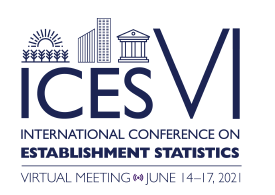All Times ET
Program is Subject to Change
TBD
Survey Communication for the Newly Developed Business Survey (307987)
*Leanne Houben, Statistics NetherlandsKeywords: The design of a new complex survey for the very large non-financial enterprises in the Netherlands: process, methods, and lessons learned
Survey communication for the newly developed business survey Leanne Houben, Statistics Netherlands, apm.houben@cbs.nl
Because of the complex structure of the new questionnaire it was likely that the introduction would have major implications for businesses, particularly for those with a significant presence abroad and/or a complex response process. The 2015 feasibility study showed that enterprises liked to have up to one year to get prepared. Consequently, we agreed to do that.
A tailored communication strategy was designed according to Snijkers and Jones (2013), and was openly supported by the Confederation of Netherlands Industry and Employers. For tailoring several subgroups were identified, on the base of cruciality, inconsistencies in former reported survey-data, differences in contact persons for both the former CBS and DNB questionnaires, and newly selected enterprises.
The total strategy consisted of three phases: 1. Pre-field phase: The pilot year 2018, in which businesses were aided to get prepared. To nudge them to use the new questionnaire, we used several communication instruments, varying from a simple folder to tailored motivational calls, and a business information day. 2. Field phase: The survey itself, starting in April 2019 when businesses had to report on the first quarter of 2019. Apart from the usual advance and reminder letters, colleagues were instructed to call businesses that had not yet logged-in and assist them in case of questions with working with the questionnaire. 3. Post-field phase: The last phase consisted of the enforcement process after the survey deadline, as well as post-field re-contacts for data validation.
The new communication strategy is evaluated thoroughly. E.g., the effect of the pre-field communication: did businesses actually get ready? The response progress and the effects of the phone calls in the field stage. During the presentation we will zoom in on these actions and discuss the effects in detail.
